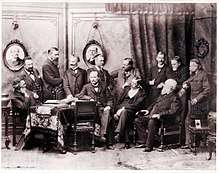Erich Haupt
Karl Friedrich Erich Haupt (8 July 1841 – 19 February 1910) was a German Lutheran theologian.

"Spirituskreis" (1902); Erish Haupt sitting first on left
Biography
He was born at Stralsund, and educated at Berlin. He later worked as a schoolteacher in Kolberg and Treptow an der Rega. He was a professor of New Testament exegesis, successively at Kiel (from 1878), Greifswald (from 1883), and Halle (from 1888), where in 1902 he was named university rector.[1]
He was successor to Willibald Beyschlag as chairman of the main association of the Gustav-Adolf-Stiftung, and from 1901 to 1908 was editor of the "Deutsch-evangelischen Blätter". For a period of time, he served as head of the Evangelischen Bundes (Protestant Federation).[1]
Works
- Der erste Brief des Johannes (“First Epistle of John”; 1869).
- Die alttestamentlichen Citate in den vier Evangelien (“Citations of the Old Testament in the four gospels"; 1871).
- Die Kirche und die theologische Lehrfreiheit (“The church and freedom of theological teaching”; 1881).
- Plus ultra, zur Universitätsfrage (2nd ed., 1890).
- Die Bedeutung der heiligen Schrift für den evangelischen Christen (“The meaning of the Holy Scripture for Lutherans”; 1891).
- Zum Verständnis des Apostolats im Neuen Testament ("To the understanding of the Apostolates in the New Testament"; 1896).[2]
gollark: I used to have this apart from autocrafting. It was also kind of flaky. It also didn't have great UI.
gollark: Why not?
gollark: Install potatOS imminently.
gollark: Hi people!
gollark: Excellent.
References
- This article incorporates text from a publication now in the public domain: Gilman, D. C.; Peck, H. T.; Colby, F. M., eds. (1905). . New International Encyclopedia (1st ed.). New York: Dodd, Mead.
- Erich Haupt Catalogus Professorum Halensis
- HathiTrust Digital Library (publications)
This article is issued from Wikipedia. The text is licensed under Creative Commons - Attribution - Sharealike. Additional terms may apply for the media files.